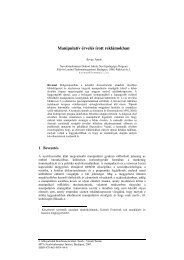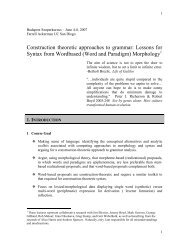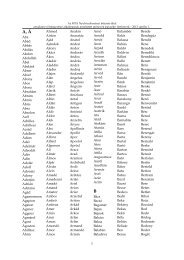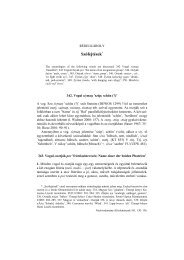Nyelvtudományi közlemények 91. kötet (1990)
Nyelvtudományi közlemények 91. kötet (1990)
Nyelvtudományi közlemények 91. kötet (1990)
Erfolgreiche ePaper selbst erstellen
Machen Sie aus Ihren PDF Publikationen ein blätterbares Flipbook mit unserer einzigartigen Google optimierten e-Paper Software.
134 MIKLÓS KONTRA<br />
unaspirated), all but one wrote podium. Thus here listeners "added" aspiration<br />
to the perceived phonetic shape. When context invited listeners "to<br />
add" voicing to what they heard (e.g. John grew a pushy beard, with pushy<br />
pronounced with an unaspirated p), they did so: 17 out of 26 subjects wrote<br />
bushy. However, when context made genuine ambiguity possible, as in Did<br />
you say Ted? (with Ted unaspirated), subjects' responses were different: 14<br />
wrote dead, 5 Ted, and 7 wrote other words (e.g. Ed, said, bed) or nothing.<br />
It seems, then, that native speakers adjust the heard phonetic shapes to the<br />
linguistic context, and they do so whenever context makes such adjustment<br />
possible.<br />
To turn from perception to production, let us consider the vowel<br />
harmony observable in certain Hungarian (loan)words. As is well known,<br />
in general, harmonic suffix vowels agree in backness with harmonic root<br />
vowels. Loanwords, however, often violate harmony restrictions and some<br />
of them allow either front or back suffix vowels, e.g. Ágnesnek/Agnesnak<br />
'Agnes+dative,' fotelnek/fotelnak 'armchair-fdative' etc. Vago (1980. 14)<br />
calls these alternants doublets and states that they "are in free variation."<br />
Elicitation experiments have suggested, however, that the phonological<br />
and morphological context of the sentence in which a vacillating loanword<br />
occurs may influence harmonic suffix vowel choice. When subjects had to<br />
provide the appropriate suffix for the word karakter 'character' in different<br />
test sentences, their choices were influenced by the test sentences. For instance,<br />
significantly more subjects used the front suffix -ben 'in' in a sentence<br />
like (1)<br />
(1) Ebben a karakter... nincs fantázia.<br />
than in (2)<br />
(2) Abban a karakter... sincs semmi érdekes.<br />
That is: when the test word followed a word with the front vowel allomorph<br />
of the same suffix as was appropriate for the test word, 93.9% of the subjects<br />
used the front allomorph, but only 78.8% did so when the back allomorph of<br />
the elicited test suffix occurred in the sentence (cf. Kontra and Ringen 1986.<br />
11-12).<br />
Recent elicitation experiments show that morphological context does<br />
indeed account for a good deal of the vacillation in the suffocation of certain<br />
Hungarian (loan)words. 59 subjects were presented with 36 sentences,<br />
each containing an uninflected word followed by a blank, and were asked<br />
to supply the appropriate suffix. Three test words were used in twelve different<br />
contexts. All three words vacillate: férfi 'man' (an opaque compound<br />
allowing either back or front allomorphs of certain suffixes), sláger 'hit tune'<br />
Nyelvtudományi Közlemények <strong>91.</strong> <strong>1990</strong>.


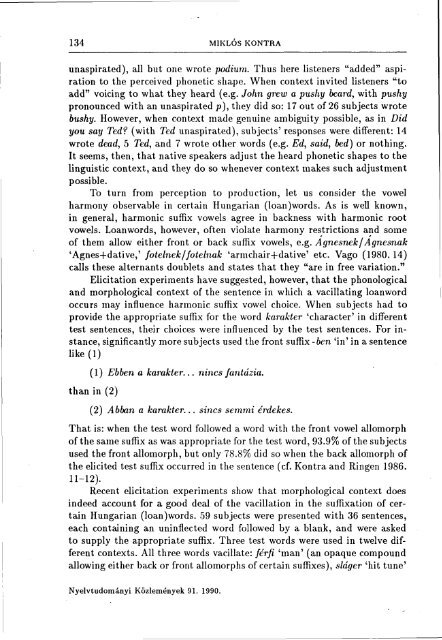
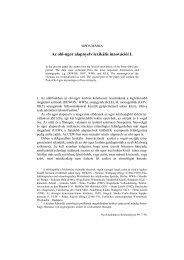
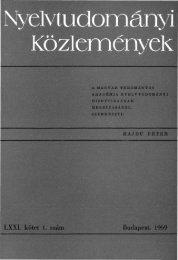
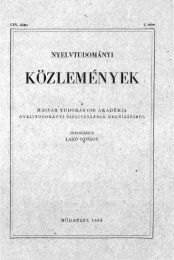
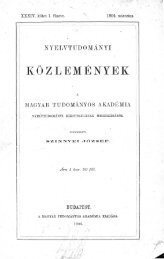
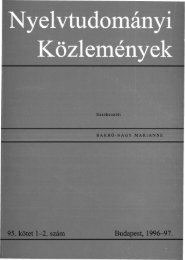
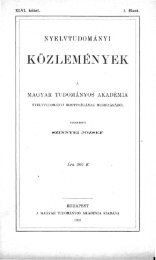
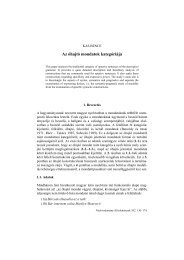
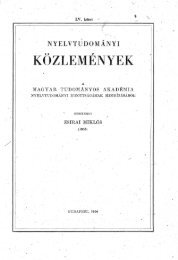
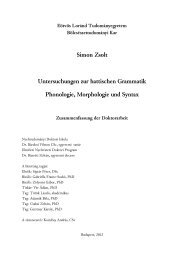
![Gósy Mária: A [p, t, k] mássalhangzók zöngekezdési ideje Bevezetés ...](https://img.yumpu.com/15682849/1/190x245/gosy-maria-a-p-t-k-massalhangzok-zongekezdesi-ideje-bevezetes-.jpg?quality=85)
